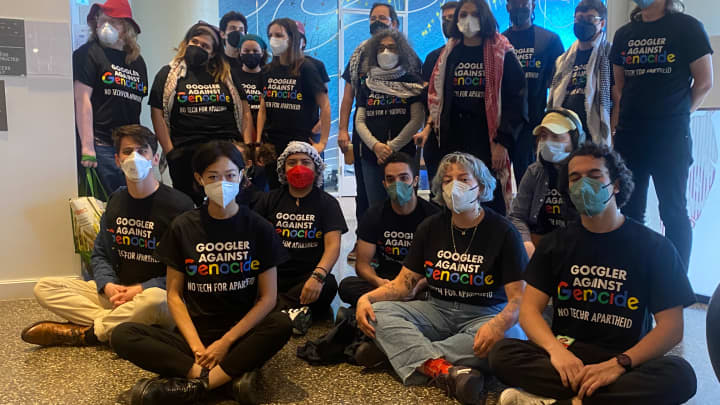By Our Reporter
Google has fired more than two dozen employees who protested this week against the company’s cloud computing contract with the Israeli government.
The workers were dismissed after an investigation found that they had staged protests inside Google’s offices in New York and Sunnyvale, California. In Sunnyvale, they entered the office of Google Cloud CEO Thomas Kurian, according to a post on social media by the group that organized the demonstration, No Tech For Apartheid.
Protesters held banners that read “No More Genocide For Profit” and “We Stand with Palestinian, Arab and Muslim Googlers.”
A Google spokesperson told CNN Thursday that the protests “were part of a long-standing campaign by a group of organizations and people who largely don’t work” at the company.
“A small number of employee protesters entered and disrupted a few of our locations. Physically impeding other employees’ work and preventing them from accessing our facilities is a clear violation of our policies, and completely unacceptable behavior. After refusing multiple requests to leave the premises, law enforcement was engaged to remove them to ensure office safety,” the spokesperson added.
“We have so far concluded indi1vidual investigations that resulted in the termination of employment for 28 employees, and will continue to investigate and take action as needed.”
Google and Amazon have a $1.2 billion contract to provide cloud computing services to the Israeli government and military, known as Project Nimbus, according to No Tech For Apartheid, who have strongly condemned the dismissals.
“This flagrant act of retaliation is a clear indication that Google values its $1.2 billion contract with the genocidal Israeli government and military more than its own workers,” the group said in a statement published on Medium Thursday.
Israel has rejected claims it is committing genocide in Gaza, arguing that it is fighting its war against Hamas in self-defense. Hamas attacked Israel on October 7, killing about 1,200 people and taking more than 250 hostages.
Google Cloud and Israel




Google Cloud’s contract with the Israeli government dates back to 2021, when the company announced that it had been chosen to provide “public cloud services to help address the country’s challenges within the public sector, including in healthcare, transportation, and education.”
But the protests followed a report in Time magazine earlier this month, citing an internal company document, that Israel’s Ministry of Defense is a Google Cloud customer.
According to Time, the ministry has its own secure entry point to Google-provided computing infrastructure, which would allow it to store and process data, and access artificial intelligence services. Earlier this year, the ministry also sought consulting assistance from Google to expand its Google Cloud access, Time reported.
No Tech for Apartheid said the article showed that Google had “built custom tools” for the Ministry of Defense and had “doubled down on contracting” with Israel’s military since the war broke out.
The Google spokesperson said Google Cloud “supports numerous governments around the world, including the Israeli government.”
“We have been very clear that the Nimbus contract is for workloads running on our commercial cloud by Israeli government ministries, who agree to comply with our Terms of Service and Acceptable Use Policy. This work is not directed at highly sensitive, classified, or military workloads relevant to weapons or intelligence services,” the spokesperson added.
Separately, Google confirmed that it is making an unspecified number of fresh layoffs as part of an internal reorganization. The job cuts will not be company-wide, and impacted employees will be able to apply for other open roles across Google.
Google laid off hundreds of employees earlier this year, adding to a wave of job cuts in the tech and media industries, including at Amazon, Vice and the Los Angeles Times



























